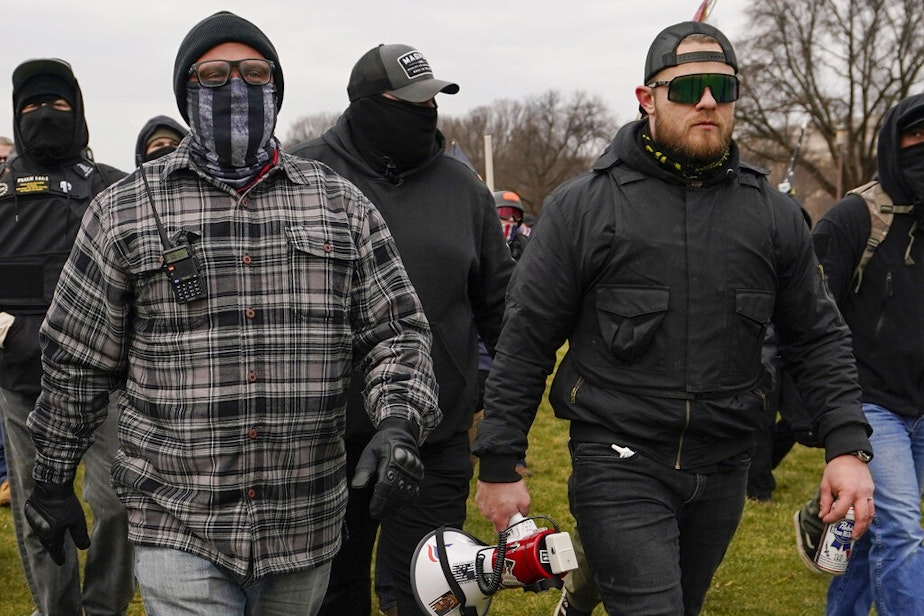How Trump's blanket clemency for January 6 rioters impacts the PNW

President Trump pardoned or commuted the sentences of all of the January 6 U.S. Capitol riot defendants this week. Over 1,500 people were charged with or convicted of crimes, ranging from sedition to felony assaults to misdemeanor charges that amounted to little more than trespassing. The vast majority received pardons. 14 sentences were commuted.
Critics have raised concerns that Trump's use of executive privilege to grant a blanket amnesty essentially endorses violent, anti-democratic behavior. Oregon Public Broadcasting reporter Troy Brynelson has a story out about how some Pacific Northwest defendants are responding to the president's move. He told KUOW’s Kim Malcolm about his reporting.
This interview has been edited for clarity.
Kim Malcolm: You wrote there's no consensus among the now pardoned defendants. Some are proud of what they did and are ready to double down. Others say they regret their involvement. Tell me about your conversation with one of them, a man named Scott Ray Christensen.
Troy Brynelson: Scott is a real estate agent in Puyallup. He and his wife were both caught up in this. They had only entered the building for less than half an hour. His conviction was basically to pay a $1,000 fine to the federal government. And looking back on it, he calls it a nightmare that he is frequently reliving:
“It's a burden that I will probably wear the rest of my life, and I wish I didn't have to. Am I proud of what I did? No, I'm not. Am I repentant, and would I do it ever again? No, I would not. I have problems going to Sounders games because I'm spooked of crowds. I'm so uncomfortable, and in my head, I'm like, if, if I'm sitting in the ECS right now and a fight breaks out, I'm screwed, because I'm going to be looped into that.”
He felt like he got caught up in a moment. He had been going to the Capitol under the impression, he says, that Trump was going to be speaking again, and that's why he went there.
Sponsored
Did he say anything about being involved in politics in the future? How does he see that?
He still is a very much a Trump supporter and voted for Trump in this last election, welcomes the pardon, for example, but doesn't feel like he himself is going to be as involved in politics anymore going forward. He doesn't even want to be going to school board meetings anymore, for fear of getting caught up in that crowd mentality.
A more prominent name among the Washington defendants is Ethan Nordean of Auburn, who is well known in the Pacific Northwest for participating in political street violence with the Proud Boys. He received an 18-year sentence in prison for seditious conspiracy. Have you learned anything about his reaction to having his sentence commuted?
I have not reported directly on anything related to Nordean after getting his sentence commuted. The reason why we discuss him in the piece is that he was a known quantity in the Pacific Northwest, as you just mentioned, for engaging in a lot of the political street violence that we saw in Seattle and Portland. And his sentence encompasses the debate that the country was having prior to Trump's actual signing of the pardons. There was this question of, how far will these pardons go?
We know that Nordean wasn't just parading and demonstrating in a government building. He was convicted of sedition. The reason why we're discussing this now, though, is that because his sentence is commuted, he's coming back, presumably, potentially to the Pacific Northwest, and it's an open question what that could mean for the region.
Sponsored
In your reporting, you also spoke with Luke Baumgartner, who researches domestic extremism at George Washington University. What were some of his takeaways about what President Trump did in issuing these pardons and commutations this week?
He worries that Trump's decision to pardon and commute sentences, not just for folks who were just demonstrating in a government building, that that could be sending a dangerous signal to other defendants who are getting pardoned or their sentences commuted. Here's some of what he told me:
“Pardoning these folks is basically a tacit endorsement of their behavior, saying that what you did on this day was acceptable. It's okay for you to engage in political violence.”
Listen to the interview by clicking the play button above.





